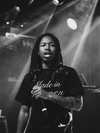Mavi Celebrates the Sadness on Tour in Boston
Backstage and in the crowd at the introspective rapper’s recent show, where his harrowing songs transformed into anthems of overcoming.

At Boston’s Paradise Rock Club in September, Mavi enters a modest green room with backpacks and duffels scattered around, and two small chip and vegetable platters sitting in front of wall outlets painted to look like the members of Kiss. The rapper and producer Ovrkast, one of the night’s openers, is making a beat in the corner, quietly tapping away on his sampler. It’s an immediately calm and inviting atmosphere, an upgrade from Mavi’s previous tours. “This how we comin’,” he says, proudly surveying the room between bites of a pre-show chicken and shrimp burrito.
In a crisp white tee and black LRG sweatpants, the North Carolina native admits to feeling fear during his first big shows, when Jack Harlow brought him out on the road in 2021. Since then, he’s become an indie rap mainstay and a bona fide headliner. But these gigs, in support of his harrowing third studio album, Shadowbox, feel different. “When I did my first solo tour, I was known,” he says. “Now, I feel loved.” He pauses to reflect on the difference between the two. “I don’t think everything you know is a choice, but I do think everything you love is a choice,” he explains. “The things people who come to these shows share with me and the encouragement they give me—it feels hella love.”





